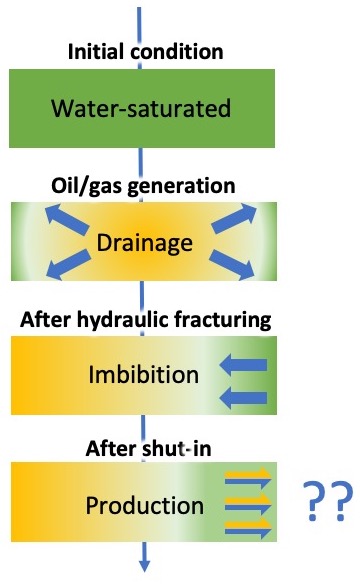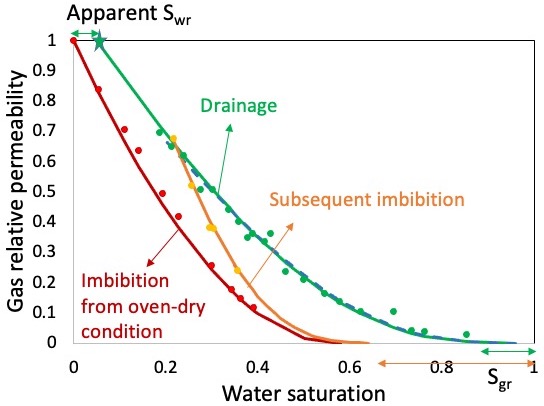Gas relative permeability and hysteresis in shale

Relative permeability is one of the most critical parameters for reservoir modeling. However, direct measurements of gas-water relative permeability for unconventional reservoir rocks are rare, and the influence of relative permeability hysteresis on reservoir studies has not yet been addressed. In unconventional reservoirs, oil and gas generation is a drainage-dominant process from initially water-saturated condition. After hydraulic fracturing, water imbibition is the dominant process in the stimulated rock volume (SRV). The fact that relative permeability in drainage and imbibition is different can thus have important influence on both hydrocarbon and water production.

In this research, gas relative permeability is measured using the modified gas expansion method, and water relative permeability is estimated with a modified Brooks-Corey equation. (Direct measurement of water relative permeability is under development). Gas relative permeability is found to be lower in imbibition than that in drainage at the same water saturation. After hydraulic fracturing, gas permeability is substantially reduced due to the combined effect of enhanced water saturation in the imbibition zone and lower gas relative permeability. This negative influence on production may last if the water saturation in the imbibition zone cannot be reduced during the production.
Representative publications
Peng, S, 2020. Gas-Water Relative Permeability of Unconventional Reservoir Rocks: Hysteresis and Influence on Production after Shut-in. Journal of Natural Gas Science and Engineering. doi:10.1016/j.jngse.2020.103511. This paper was also presented at URTeC 2020.
Peng, S., 2019. Gas Relative Permeability and Evolution during Water Imbibition in Unconventional Reservoir Rocks: Direct Laboratory Measurement and A Conceptual Model. SPE Reservoir Evaluation & Engineering-Formation Evaluation, SPE-198896-PA, doi:10.2118/198896-PA.
Peng, S., B. Ren, M. Meng, 2019. Quantifying the Influence of Fractures for More Accurate Laboratory Measurement of Shale Matrix Permeability using a Modified Gas Expansion Method, SPE Reservoir Evaluation & Engineering-Formation Evaluation, SPE-195570-PA, doi:/10.2118/195570-PA.